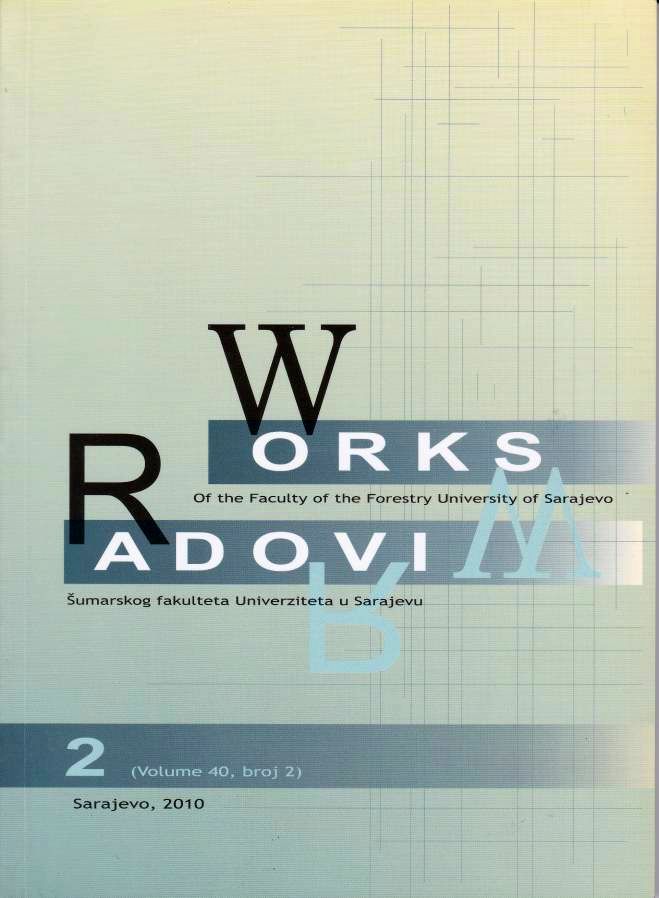ADVOCACY COALLITIONS AS AGENTS OF CHANGE IN CLIMATE CHANGE POLICY MAKING – A CASE STUDY OF BOSNIA- HERZEGOVINA
DOI:
https://doi.org/10.54652/rsf.2010.v40.i2.152Keywords:
Climate change policy, Bosnia-Herzegovina, advocacy coallitionsAbstract
UDK 502.3:551.583(497.6)
Bosnia and Herzegovina (BiH) ratified the United Nations Framework Convention on Climate Change (UNFCCC) in 2000 and Kyoto protocol in 2008. Although a Non-Annex I Party (developing country) to UNFCCC, but with its goals to EU accession, efforts have been made to set up appropriate guidelines, institutional and legal framework to meet the Convention commitments. Nevertheless, the political arena of BiH within the climate change context is still affected by the complexity of its administrative setup, lack of state level legislation, absence of coordination and inter- sectoral cooperation as well as inadequate enforcement mechanisms. Based on the social movement theory and the concept of advocacy coalition framework, the research results collected through a detailed analysis of media reports and questionnaire-based survey findings (based on the guidance of the COMPON project) explain the setbacks and describe the possibilities of social mobilization, formation of coalitions in the framing of climate change aspects as well as their influence within the wider milieu of the national policy discourse. The lack of information sharing and limited awareness among stakeholders has resulted in low social mobilization exercised around the issue, hence creating a perfect setting for a delay on progress in terms of clear climate change policies, adaptation and mitigation programs along with strategies for capacity building in the domain. Evermore, it keeps the domestic political institutions clinging to status quo, while current extent of activation of the society and networks to tackle the problem and have an effect on national policy processes remains fragile.
References
COHEN, L., BAER, N., SATTERWHITE, P. (2005): Developing Effective Coalitions: An Eight Step Guide, Edited by: Kelly O'Keefe in the Talented and Diverse Leadership We Need Developing the Nonprofit Sector Workforce for the 21st Century Draft Working Paper.
HELM, D. (2005): “Climate Change Policy”. Oxford University Press, USA.
DOWDING, K., (1994): “Model or metaphor: a critical review of the policy network approach” Political study 43.
FISHER, D. (2004): National Governance and the Global Climate Change Regime. Lanham, Md.: Rowman & Littlefield Publishers.
FREEMAN, L. (2006): The Development of Social Network Analysis. Vancouver: Empirical Pres.
HANNEMAN, R. A., RIDDLE, M. (2005): Introduction to social network methods. Riverside, CA: University of California, Riverside ( published in digital form at http://faculty.ucr.edu/~hanneman/ ).
IPCC, Intergovernmental Panel on Climate Change., (2007): “Fourth Assessment Report—Intergovernmental Panel on Climate Change Working Group 1: The Physical Basis of Climate Change” (http://ipcc-wg1.ucar.edu/wg1/wg1- report.html).
SALKIĆ, I. (2008), Izvještaj sa serije okruglih stolova: „Razvoj političkog pluralizma u Bosni i Hercegovini“, Fakultet političkih nauka, Sarajevo (report retrieved from http://www.fes-bih.com.ba/izvjestaji/20080221 Razvoj-politickog- pluralizma-u-BiH-BH.pdf on 15.01.2009.).
SEJFIJA, I. (2006): From the “Civil Sector” to Civil Society?, Progress and Prospects.
HAGE, J. T. (1999): “Organizational Innovation and organizational change” Annual Review of Sociology. Volume 25, Page 597-622.
JANICKE, M. (2006): “The Environmental State and Environmental Flows: The Need to Re-Invent the Nation State.” in Governing Environmental Flows: Global Challenged to Social Theory, edited by G. Spaargaren, A. Mol and F. Buttel. Cambridge: MIT Press.
JONES C., HESTERLY, W., BORGATTI, S. (1997): A General Theory of Network Governance: Exchange Conditions and Social Mechanisms, Academy of Management.
KNOKE, D. (2007): “Network Analysis (Quantitative Applications in the Social Sciences)”. Sage Publications, Inc; 2nd edition.
KNOKE, D. (2007): “Social Network Analysis (Quantitative Applications in the Social Sciences)”. Sage Publications, Inc; 2nd edition.
KNOKE, D., PAPPI, F., BROADBENET, J., TSUJINAKA, Y. (1996): Comparing Policy Networks: Labor Politics in the U.S., Germany and Japan. New York: Cambridge University Press.
HARASZTI, M. (2007): Organizacija za sigurnost i suradnju u Evropi, Izvještaj o stanju slobode medija u Bosni i Hercegovini Javni radiotelevizijski servis BiH.
OLSON, M. (1965): The Logic of Collective Action: Public Goods and the Theory of Groups. Cambridge, MA: Harvard University Press.
RAAB, J., KENIS, P. (2007): “Taking Stock of Policy Networks: Do They Matter?” In Handbook of Public Policy Analysis: Theory, Methods and Politics, edited by Fischer, Miller and Sidney.
RODGERS, C. (2006): “Informal Coalitions: Mastering the Hidden Dynamics of Organizational Change”. Palgrave Macmillan Press.
SABATIER, P. A. (2007):”Theories of the Policy Process: 2”. Westview Press; 2 edition.
SABATIER, P. A. (1993): “Policy Change and Learning: Advocacy Coalition Approach (Theoretical Lenses on Public Policy)”. Westview Press.
SABATIER, P., JENKINS-SMITH H. (1999): “The Advocacy Coalition Approach: An Assessment.” edited by SABATIER, P., Boulder CO.: Westview Press.
SNOW, D., A., ROCHFORD, E.B., WORDEN, S.K., BENFORD, R.D. (1986): “Frame Alignment Processes, Micromobilization, and Movement Participation.” American Sociological Review 51.
The role of media in a democracy: a strategic approach (1999) Technical Publication Series Center for Democracy and Governance Bureau for Global Programs, Field Support, and Research.
UDOVIČIĆ, Z. (1996): Mediji u BiH – Osvajanje Demokratije,Media Plan Institute.
United Nations Subsidiary Body for Implementation, (2007): “Framework Convention on Climate Change: National Greenhouse Gas Inventory Data for the Period 1990-2004 and Status of Reporting.”
WASSERMAN, S., FAUST, K. (1994): Social Networks Analysis: Methods and Applications. Cambridge: Cambridge University Press. A short, clear basic summary is in Krebs, Valdis. (2000). "The Social Life of Routers." Internet Protocol Journal, 3 (December): 14-25.


















